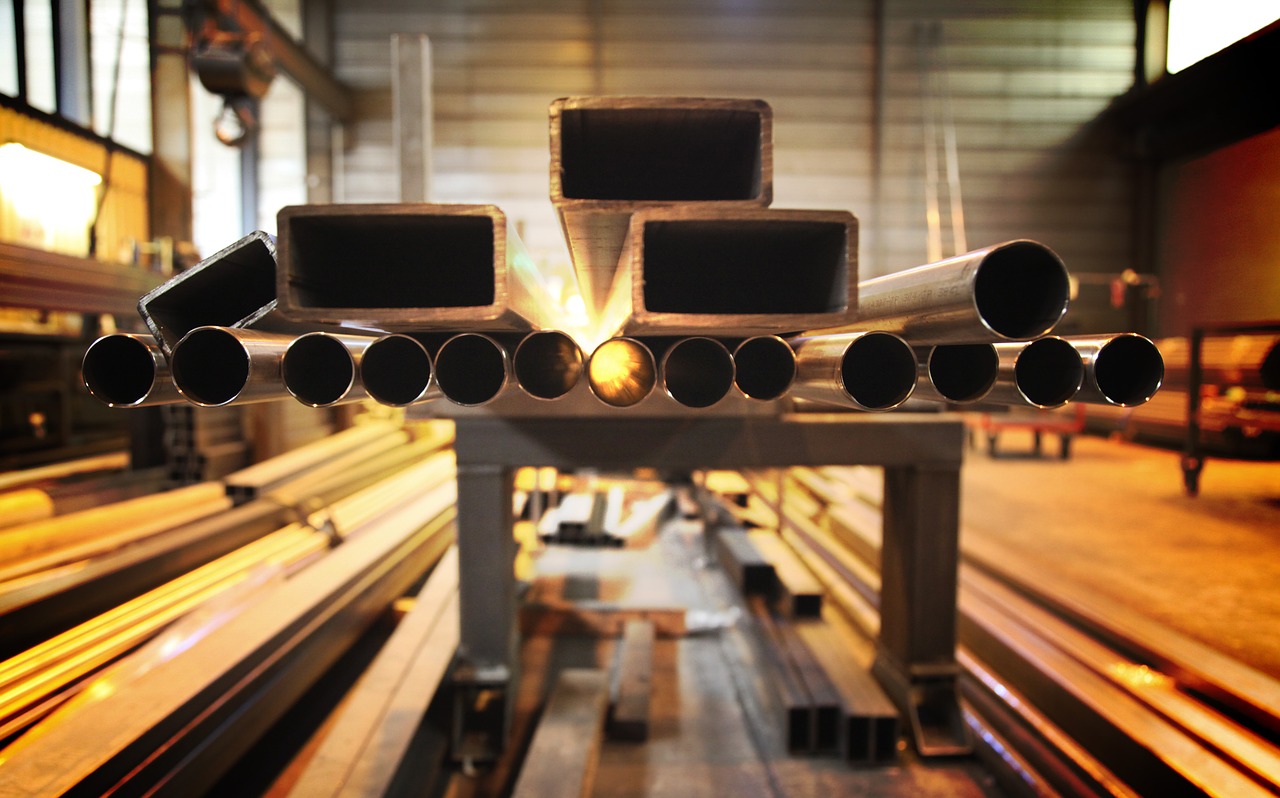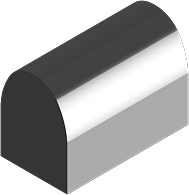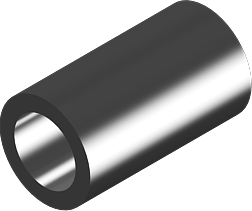Steel 4340
View AMS Numbers >
Steel 4340
Steel 4340 is a medium-carbon nickel-chromium-molybdenum steel alloy with excellent tensile strength, toughness, and fatigue resistance. Since the material usually comes in the annealed condition, additional heat treatments (oil quenching and tempering, or normalizing and tempering) can produce parts with even higher strength and fatigue resistance.
Furthermore, Steel 4340 is a wear-resistant material with especially good abrasion resistance, shock- and -impact resistance, and excellent atmospheric corrosion resistance. The alloy also possesses very good ductility, especially in the annealed condition, where it can be easily formed and machined.
Thanks primarily to its toughness, Steel 4340 finds use in heavy machinery, specifically for the manufacturing of transmission parts, such as heavy-duty shafts, gears, and axles.
Other uses include the military industry – both for ground vehicles and military aircraft, commercial aircraft industry (landing gear), various automotive uses, rocket motor cases, pressure vessels, fasteners, ordnance hardware, etc.
Tech Steel & Materials offers Steel 4340 in seven specifications and multiple shapes/forms:
- AMS 6359 (Plate, Sheet, and Strip)
- AMS 6409 (Bar, Forging, and Tubing)
- AMS 6414 (Bar, Forging, and Tubing)
- AMS 6415 (Bar, Forging, and Tubing)
- AMS 6454 (Plate, Sheet, and Strip)
- AMS 6456 (Wire)
- AMS 6484 (Bar, Forging, and Tubing)
Steel 4340 Chemical Composition
| Element | Min (%) | Max (%) |
| Carbon, C | 0.370 | 0.430 |
| Manganese, Mn | 0.600 | 0.800 |
| Silicon, Si | 0.150 | 0.300 |
| Phosphorous | — | 0.0350 |
| Chromium, Cr | 0.700 | 0.900 |
| Nickel, Ni | 1.65 | 2.00 |
| Molybdenum, Mo | 0.200 | 0.300 |
| Sulfur, S | — | 0.0400 |
| Iron, Fe | — | *Balance |
*Not exclusively to the element mentioned, but that one predominates other elements that are used in smaller quantities.
Fabrication and Working Instructions
Steel 4340 is readily machinable using standard methods, including sawing, turning, drilling, cutting, boring, etc. A coarse lamellar pearlitic structure or a spheroidized structure are recommended for the best results.
Nonetheless, it’s strongly recommended to machine the material in the annealed condition since machinability significantly decreases after heat treatments since the strength of the material increases. If necessary, a spheroidized structure can improve machinability in the heat-treated condition.
Steel 4340 also possesses excellent ductility in the annealed condition.
For the best mechanical properties, the material should be welded in the annealed condition. Furthermore, welding should be outright avoided in the hardened and tempered condition since there is a danger of quench cracking.
If welding in the hardened condition is absolutely necessary, then the material should be preheated from 400-580 °F to (≈200-300 °C), followed by after-welding stress relief at 1020-1200 °F (≈550-650 °F). For tempered-condition material, the stress relief should be 60 °F (15 °C) lower than the tempering temperature.
Steel 4340 Physical Properties
| Property | Imperial | Metric |
| Mean Coefficient of Thermal Expansion 68 °F to 212 °F (20 °C to 100 °C) oil-hardened; tempered @ 1100 °F (600 °C) | 6.83 [10-6/°F] | 12.3 [10-6/K] |
| Mean Coefficient of Thermal Expansion 68 °F to 390 °F (20 °C to 200 °C) oil-hardened; tempered @ 1100 (600 °C) | 7.06 [in/in/°F·106] | 12.7 [10-6/K] |
| Mean Coefficient of Thermal Expansion 72 °F to 500 °F (22 °C to 260 °C) normalized & tempered | 7.0 [10-6/°F] | 12.6 [10-6/K] |
| Mean Coefficient of Thermal Expansion 68 °F to 750 °F (20 °C to 400 °C) oil hardened; tempered @ 1100 (600 °C) | 7.61 [10-6/°F] | 13.7 [10-6/K] |
| Thermal Conductivity (@ 212 °F) (@ 100 °C) | 309 Btu/(hr/ft²/in/°F) | 44.5 [W/m-K] |
Steel 4340 Mechanical Properties
| Property | Imperial | Metric |
| Ultimate Tensile Strength | 161000 psi | 1100 MPa |
| Yield Strength | 103000 psi | 710 MPa |
| Elongation at Break (in 4D) | 13.2 % | 13.2 % |
| Rockwell Hardness C | 35 | 35 |
| Rockwell Hardness B | 99 | 99 |
| Brinell Hardness | 321 | 321 |
| Knoop Hardness | 348 | 348 |
| Vickers Hardness | 339 | 339 |
| Reduction of Area | 36 % | 36 % |
| Machinability (annealed and cold-drawn condition) | 50 % | 50 % |
| Modulus of Elasticity | 29700 ksi | 205 |
| Shear Modulus | 11600 ksi | 80 GPa |
| Poisson’s Ratio | 0.29 | 0.29 |
| Bulk Modulus | 20300 ksi | 140 GPa |
Heat Treatment
Dramatically improved tensile strength and toughness properties of Steel 4340 can be obtained depending on the heat treatment used. The alloy usually comes in the annealed condition unless specified otherwise.
The standard annealing process for Steel 4340 starts at 1525 °F (830 °C), followed by cooling to 1350 °F (730 °C), and furnace cooling to 1130 °F (610 °C) at 11 °F (20 °C) per hour, followed by air cooling to room temperature.
Steel 4340 is usually normalized at 1500 °F (815 °C) +/- 50 °F (10 °C). Furthermore, the standard hardening temperature is 1500-1550 °F (815-845 °C), followed by tempering for stress relief.
After tempering, flame or induction hardening will produce material with Rc 50, while nitriding will produce Rc 60.
Select AMS Number:
| AMS Number | Alloy | Type | UNS | Cross Ref. Spec | Misc./Shape | |
|---|---|---|---|---|---|---|
| AMS 6359 Plate | 4340 | Steel | G43400 | - | Plate |
 |
| AMS 6359 Sheet | 4340 | Steel | G43400 | - | Sheet |
 |
| AMS 6359 Strip | 4340 | Steel | G43400 | - | Strip |
 |
| AMS 6409 Bar | 4340 | Steel | G43400 | - | Bar |
 |
| AMS 6409 Forging | 4340 | Steel | G43400 | - | Forging |
 |
| AMS 6409 Tubing | 4340 | Steel | G43400 | - | Tubing |
 |
| AMS 6414 Bar | 4340 | Steel | G43400 | - | Bar |
 |
| AMS 6414 Forging | 4340 | Steel | G43400 | - | Forging |
 |
| AMS 6414 Tubing | 4340 | Steel | G43400 | - | Tubing |
 |
| AMS 6415 Bar | 4340 | Steel | G43406 | MIL-S-5000 | Bar |
 |
| AMS 6415 Forging | 4340 | Steel | G43406 | MIL-S-5000 | Forging |
 |
| AMS 6415 Tubing | 4340 | Steel | G43406 | MIL-S-5000 | Tubing |
 |
| AMS 6454 Plate | 4340 | Steel | G43400 | - | Plate |
 |
| AMS 6454 Sheet | 4340 | Steel | G43400 | - | Sheet |
 |
| AMS 6454 Strip | 4340 | Steel | G43400 | - | Strip |
 |
| AMS 6456 |
4340 | Steel | - | - | Wire |
 |
| AMS 6484 Bar | 4340 | Steel | G43400 | AMS-S-5000 | Bar |
 |
| AMS 6484 Forging | 4340 | Steel | G43400 | AMS-S-5000 | Forging |
 |
| AMS 6484 Tubing | 4340 | Steel | G43400 | AMS-S-5000 | Tubing |
 |

 Tech Steel & Materials
Tech Steel & Materials